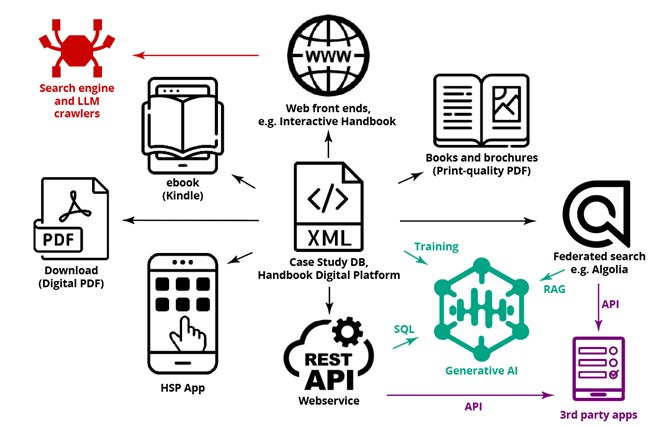XML-first publishing: A smart approach to sharing humanitarian knowledge
By Tristan Hale, Operations Director, Sphere
In today’s digital age, humanitarian organisations and other aid agencies require information to be accessible, adaptable, and cost-effective. XML[1]-first publishing, where content is authored and managed as structured XML and made available via multiple formats, delivers exactly that.
Not only does this approach lower publishing costs; it also ensures consistency across access points (online, mobile, print, API, etc.), and it is future-proofed for evolving trends in how people access and interact with content – notably from static formats like PDF to interactive platforms, and from traditional search engines to large language models and other AI platforms.
This means that people affected by crisis and those assisting them can access life-saving guidance faster, in the format that works best for them.
Sphere’s journey: XML-first in action across the HSP
Since 2018, Sphere has embraced and promoted an XML-first publishing workflow across the Humanitarian Standards Partnership (HSP) portfolio. This approach underpins the Sphere Handbook and its companion standards, enabling efficient updates and seamless integration into digital platforms.

Photo of the CPMS handbook and mock-ups of the SEADS and LEGS handbooks
Did you know that the latest editions of the Child Protection, SEADS (crop-related livelihoods), and LEGS (livestock) handbooks were designed and published on our XML-first publishing platform? In printed format, they are indistinguishable from books published using traditional approaches, but the advantage of the XML approach is multiple outputs such as web front ends like the Interactive Handbook and offline mobile access via the HSP App in addition to web and print quality PDF.
Our approach streamlines workflows and scales to accommodate new content as the HSP expands and evolves.

XML at the centre: Multiple access points for both humans and machines
Next steps: Beyond the Interactive Handbook
Building on several years of successful experience with XML-powered publishing, Sphere is preparing to upgrade, enhance and expand the Interactive Handbook. The vision is to host multiple interlinked content sets – including sectoral case study libraries, implementation tools and supplementary guidance – alongside humanitarian standards. This unified XML-first architecture will enable new content from multiple providers to be developed natively on the platform and instantly available via multiple routes – and we can also onboard existing documents.
This expansion means that organisations producing documents related to humanitarian standards can share and contribute content to a single data ecosystem. New content will benefit from the same low-cost multi-format delivery that the HSP enjoys, making it instantly available to the hundreds of thousands of users already using Sphere’s platforms. This will allow some traditional document/PDF libraries to be switched off, removing redundancies and increasing efficiency across the sector.
“The humanitarian sector needs to become more efficient, so every platform turned off without loss of important content or functionality is a step in the right direction.”
The evolved platform will keep the great features of the Interactive Handbook – including fast and flexible semantic searching, decent Search Engine Optimisation (SEO), and top-rated accessibility (tested against WCAG 2.1) – with new features like context awareness and ‘intelligent’ content suggestion.
Join us: A call to humanitarian content creators
It is likely that your organisation is creating content that complements humanitarian standards – such as case studies, sectoral insights, community feedback, assessments, research, contextual guidance, etc. – and that you are looking for an alternative to publishing as static PDFs.
If so, Sphere’s expanding XML-first platform offers you a better way forward.
By adopting our publishing approach and integrating your content with ours, the benefits are significant:
- Broader reach through multiple entry points;
- Streamlined publishing eliminating repetitive and costly ‘typesetting’;
- Greater impact as your content radiates out alongside the most comprehensive and widely used sets of humanitarian standards.
Ready to bring your publishing workflows into the 21st Century?
Please share this post with colleagues and contact Sphere at communications@spherestandards.org
Sphere’s XML-first publishing platform is powered by River Valley Technologies (https://rivervalley.io/).
Our advanced search tools are powered by Algolia (https://www.algolia.com/).
[1] XML stands for eXtensible Markup Language. It allows users to define their own customised markup languages known as schemas. Sphere uses a schema called JATS which is designed for academic journals, and is well-suited to our content. XML is used for data storage and exchange, and can be easily converted into HTML (HyperText Markup Language) for webpages, as well as other formats.
